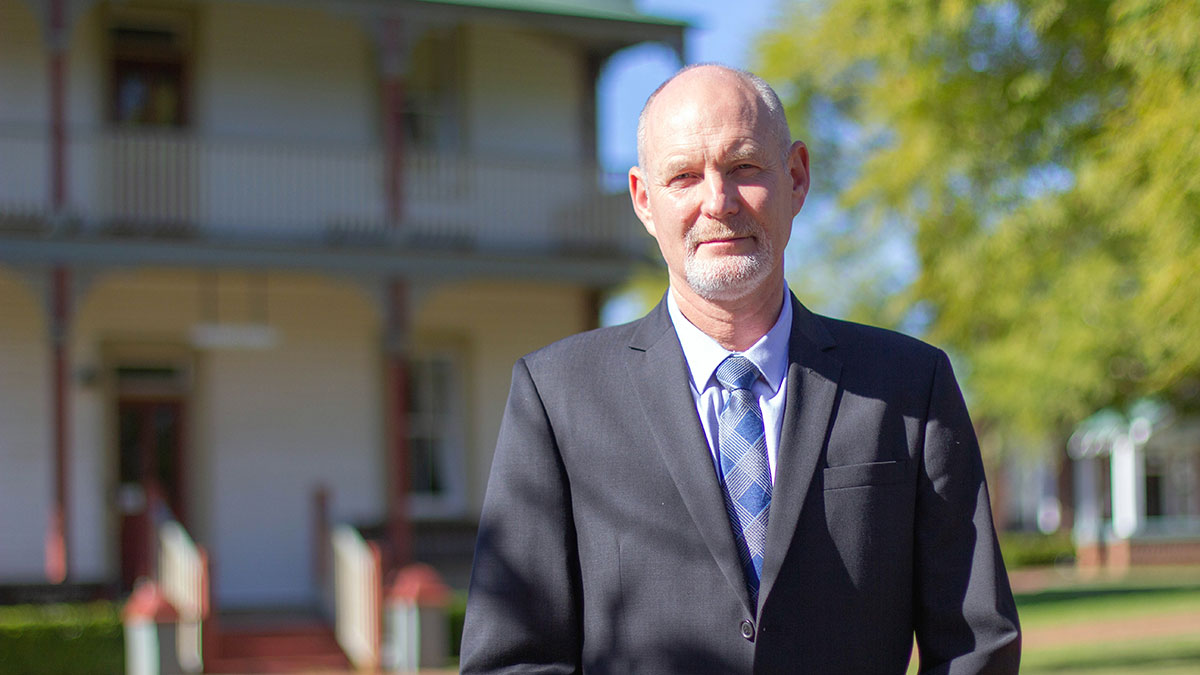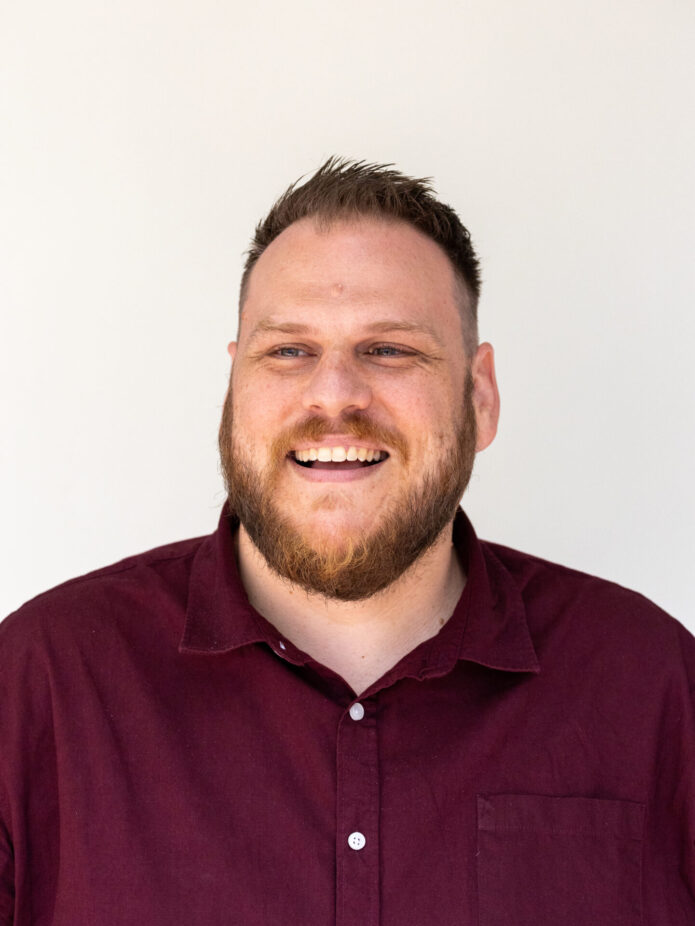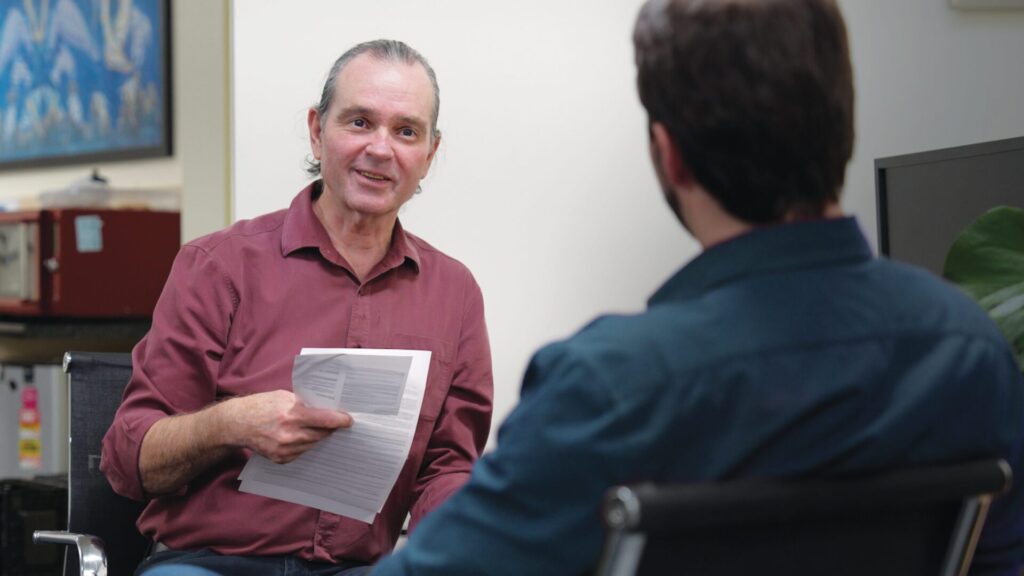Kevin Petrie, Avondale University College’s recently-appointed president/vice-chancellor, taught in primary schools for about 24 years, mostly in the New Zealand system. A proud Kiwi, originally from Christchurch, Kevin cut his teeth in higher education at La Trobe University in Melbourne before he was given an opportunity to lecture at Avondale’s School of Education. Now in his seventh year at Avondale, Kevin sat down with Adventist Record editor Jarrod Stackelroth to talk about his new role, his vision for Avondale and what makes the “Avondale experience”.
JS: Avondale’s previous president was a theologian. What does an educator, someone with your background in schools, bring to the role?
KP: As a teacher, I’m always thinking of the education experience and the quality of it. What would draw somebody to come and experience education at this institution? Can we make the student experience better? There is a hunger in most teachers to want to see the teaching and learning experience be the best that it can be. I’ve always had a really strong interest in school culture, because, putting myself back into that primary context, there’s the recognition that the climate and culture of the school has a huge impact on wellbeing and all sorts of student outcomes. I feel really strongly about the type of culture we develop and how it is experienced by staff and by students. And of course, I know how Christian education can impact, so just really want this institution to have that spiritual faith journey impact that Adventist education can have.
JS: 2020 has been a rough year. I imaging that’s created some challenges for Avondale and yourself stepping into that role. Tell us how you’ve navigated the early months with COVID-19.
KP: My first week in the role, we were beginning to realise the need to transition to an online environment. There had to be a lot of change in that first month—we were starting to move staff off campus, trying to transition students to distance mode. It was working with a team of people. We did it together with our critical incident management team and, as much as anything, it was the sheer time commitment that we had to spend navigating the space that was a real challenge. You find yourself living in a world you haven’t lived in before so, like everyone else, you’re trying to guess what the weeks and months ahead are going to bring; you’re trying to be flexible and react to changing circumstances. We did it as a team and navigated this space—it really was the combined wisdom and experience that everyone brought to the table that made it a success to be honest.
JS: Most of us start a new role a bit in the deep end, but I guess the whole world was in the deep end so you may have had a bit of an advantage coming in at that time?
KP: In that sense, absolutely. If I was coming to a role during a normal period, there are certain things I’d like to put my time [into] in that first month, but you found yourself having to put that aside and do the immediate, the critical. As you say, everyone was doing the same, so, a lot of institutions were sharing with each other and we were learning off each other.
JS: Is there anything that will change because of COVID-19 going forward?
KP: We now have improved ways of supporting distance students. We’ve tried new things. Lecturers are more confident, comfortable and capable working in that space. There are some things we’ve learnt that we’ll just keep doing. It will improve the way we do education by distance. For a number of our students, the educational experience didn’t change because they were distance students. Their personal lives changed but many don’t come near campus anyway. Even in the pastoral care area, services that chaplains and student support services have implemented are great and we want to keep doing them.
JS: What are some of the broader challenges facing Avondale?
KP: First of all, being a rural institution. In general, rural institutions struggle more. There seems to be a drift of students to the urban areas. Combined with that there is an increasing reticence for school leavers to say, “I think I’ll go away from home and board somewhere else and study at Avondale.” Increasing numbers will go, “I’m comfortable at home, I’ve got my church family and I’d really like to stay put,” and I think in the society we live, parents are increasingly wanting to keep their school leavers close too. There’s probably not the same “you need to go to Avondale” culture that there once was. For us that leads to financial challenges. Our enrolments are not as high as they were but we still have a certain infrastructure that we need to maintain, so one of our challenges at the moment is certainly the financial space. Looking at the year or two ahead, that’s one of the challenges we have to get on top of.
JS: Are there any strategies that you are already working on to address those problems?
KP: We’re looking at the way we’re structured, set up to operate, and ways we can do that more efficiently. If you have less students, you need to find efficiencies in the way you deliver your services. We need to find ways to increase income as well, so we’re looking through a number of different options: scholarships for the students to come to the dorms for it to be more affordable; one-year courses or shorter courses, so that even if people want to take a course we don’t offer, they could come for a year experience, for a semester or two; and with the services we have, there is an opportunity to encourage others to come and use our facilities. COVID has complicated what was already a challenging financial situation.
JS: What are some of the benefits of an Avondale education?
KP: The number of students that I‘ve seen whose lives have been totally changed by their experience here—and I can put my own two children in that category. Whether this is safe to publish or not, I was one of those parents that weren’t going to send my kids to Avondale. When my daughter tried to talk to me about going, I did my best to try and talk her out of it. I just felt a safety in keeping my children closer, in the church community where they were already embedded. Why risk a change? Why risk the unknown? So when I did allow my daughter to finally come here, I was pleasantly surprised at the spiritual nourishment she got, the group that she got into, a good group of friends that all wanted to pursue their spiritual walk and faith journey. I just saw her grow in ways that she wouldn’t of if she didn’t come to Avondale. I didn’t know at the time I was going to come and work here but I’ve seen that over and over again in students’ lives. There is a genuine interest and effort to engage students in a faith journey. We don’t make it a pressure but an encouragement.
You’ll see that in so many different areas, in lecturers who weave the faith journey into classes, in the worship times that we have, in the ability of College Church to involve students and to draw students in like it has, to encourage them.
Very ironic that I’m now sitting in this position as a total advocate for the ability for Avondale to transform lives. In a nutshell that’s why we exist. We are here to transform lives who then go out and transform their communities, that’s our purpose. We believe the strongest transformational influence a person can have in their life is the spirit of God working, so we encourage that journey. Students that choose to respond—for us it makes the whole effort, whatever the challenges we have here, worthwhile.
JS: Historically Avondale has been a missionary college. A lot of universities start as Christian institutions but lose that connection over the years. As Avondale chases university status, how can it maintain its Adventist identity, character and culture?
KP: Good question. I think it is really easy when you fix your eyes firmly on something else, to take your eye off the ball. I acknowledge that is really easy to do. I also know that there is a really strong belief and commitment by staff to see Adventist education retain its mission focus. One of the ways that we are looking to do this is that we’re going to begin our whole strategic planning cycle early. Even though our strategic plan runs to the end of next year, we’re looking to start in the middle of this year again. We’ve begun to talk a lot about our purpose, to make that a central focus. We know in our heart of hearts what our purpose is, what our mission is, we know why we’re here, so all the other things, whether it’s university college status or whatever it is, they’re all things that are important only so far as they tie into our mission and our purpose.
JS: The big news for Avondale recently is achieving university college status. What needs to happen now for Avondale to become a fully-fledged university?
KP: In a nutshell, we have to continue with the journey we’ve taken with the past three or four years. That means our research output and the integrity of our learning and teaching programs have to stay really strong. So it’s not so much an additional hurdle as maintaining what we have largely achieved. And that’s not all that easy to do when you’re faced with financial challenges—it’s still going to be a challenge.
JS: Avondale has partnerships with other universities. What do you see as Avondale’s contribution to the sector and what have some of those partners, Charles Sturt for example, been able to contribute to Avondale?
KP: Charles Sturt has been a valuable partner for us. They’ve been open about the fact that they’ve learnt from us and we’ve learnt from them. It’s been a collaborative journey. Our contribution to the sector? High profile scholar Ernest Boyer, for example, said the biggest challenge of higher education is not necessarily more excellence in academia but actually finding the purpose, a higher purpose. He wasn’t talking in a religious sense, he was just saying, we need a higher purpose to exist, we need to find what that really matters. So we have an opportunity as a higher education institution in Australia, to say we believe what really matters is the whole development of a person, including their spiritual side. True transformation comes when we support a person wholistically, including their spiritual side. To be able to do that with excellence has the potential to have a real impact for Christianity, for Adventist education.
JS: Avondale is educating a lot more students who are not Adventists.
KP: Yes, we certainly do have more than a few years ago. A lot of them say they enjoy the smaller classes. Some, from other Christian backgrounds, like the Christian ethos; others aren’t from any Christian background but just enjoy the more personal attention they feel they receive; some live in the local district and [Avondale] is convenient.
We have a real opportunity to explore ways to interest different cohorts of people in a faith journey. I was involved in a research project recently on this very topic but in an Adventist high school—looking at the attitudes of non-church parents to what we do in the faith area. It really highlighted to me that there are some things they are looking for—what really impacts their daily life, what are the real issues in their life and how can Christian principles actually impact those issues. A very practical approach—that’s something we need to continue to explore so we can do it better.
The impact on some of our students, even if they don’t choose to engage in a faith journey, can be substantial. We had an education student a few years ago who would count themselves as being, at best, agnostic. Yet after their journey through Avondale, they felt totally changed, they felt they left a different person. This particular person won an Australian teacher of the year award two or three years ago. We flew him back to Avondale to talk to the students. He was open about the fact that, while the God thing wasn’t his cup of tea, Avondale had changed him and because of the impact of Avondale, he went out and achieved what he did. I think broadly, God aims to reach a whole variety of people through us. They may not be people who decide to adhere to our personal philosophy now or in the foreseeable future, but that doesn’t mean we can’t have an impact and change lives and make a difference. And keep looking for ways, better ways, to keep engaging their minds and interest them.
JS: You mentioned the development of the online space and the reticence of parents to let their children too far from home. Is the future of boarding at Avondale under threat?
KP: We have to be honest that our numbers have continued to drop the past few years. But we are committed to finding ways to revitalise that space. We don’t have on our agenda an Avondale without on-campus residence. That’s just not part of our plan going forward. We’re looking for ways to make it more affordable and ways to provide support for the on-campus residences, whether academic support or emotional support. We’ve got work to do in that space but I believe we can do it.
JS: Avondale is always accused of liberalism and evolution being taught and things like that. How do you respond to the haters? To those who claim Avondale isn’t doing what it’s supposed to do?
KP: First up I would encourage people to make contact with us and find out what the truth really is. There were many things I heard that I found not to be the case when I arrived to work at Avondale. For those people who have issues, whether it’s the one you mentioned—“do you guys teach evolution?”—I think the best thing they could do is to actually make contact and find out the truth, what is really being said and what is really happening. I recognise this also means that we need to do a better job of getting the right stories out there. Sometimes we miss the mark in not being proactive enough in not getting the truth out.
Secondly, I’d like Avondale to be a place where all groups of people can feel comfortable, where we give opportunities for every student to grow from whatever point they’re at. I don’t think we’ll ever have a point where everything that we do at Avondale is going to appeal to everybody. We are an adult education institution and there will be times that students will make choices that don’t necessarily represent the general culture or tenor of the place. We would see it as our job to continue to work alongside students to encourage the right choices. Our students are adults. They will always make choices, sometimes not the ones we’d prefer.
We’re not perfect. Any church community is full of humans—are they perfect? We’re not going to claim to have it all together, but like any group of human beings we’re trying to aim towards the faith journey that God is asking of us and it’s not going to be a perfect journey.
JS: So there’s no Jesuit conspiracy?
KP: (laughs) I’m totally unaware of any. But I have heard that one. But you know, to be honest, what I find at Avondale is a staff that are just so committed to the cause and will do anything to see it go ahead.
JS: If we were to speak with you when you were finishing up your current role, what would you hope to have achieved, a legacy that you would like to leave?
KP: I would like for every area in our institution to have a culture of continually looking for ways our purpose can be fulfilled better. Almost a restless energy that we’re never quite satisfied and we’re always looking for our mission and purpose to go forward stronger. It is really easy to be caught up in the mundane.
Whether your job is maintenance or cooking or teaching, we’re so busy, we’re so caught up in what we’re doing. If we can have our constant focus on how we can fulfil our purpose better and that becomes so culturally embedded it is just the first thought that comes to our mind in our daily tasks, for me, I feel like that’s going to be a success.
And I would tie with that, continually looking for excellence in our processes—everything from the very first contact someone makes with Avondale to every part of the student journey—an absolute focus on excellence and on being the biggest support we can for the journey. The thing I dislike the most is mediocrity. If any aspect of our operation was still mediocre at the time I finished, I’d feel like I hadn’t succeeded.
JS: What’s your favourite thing about Avondale?
KP: Community. There is a strong sense of community among the staff, and amongst the students and I think as humans we were created to thrive in community and I find that here.
JS: What are you most looking forward to in this role?
KP: I’m really looking forward to working with the staff and students to really promote our transformational agenda. That journey of how we can make it happen in real ways in each area of our operation, to me, is incredibly exciting. Because that’s where we actually make change. Education is about change, it’s not about leaving people where they are. So how can we work together to facilitate it? I know the financial part is going to be a strong part of [the process] so I look forward to getting onto a financial footing where we are secure. I call it sustaining transformation.
JS: What is “The Avondale experience”?
KP: I think it is about belonging, community and connections. It’s about that ability for students to connect with each other and with staff. There is closeness and synergy between students and staff that is just a lot more powerful than you can find at some of the bigger institutions. I’d add another C and that’s change. Students will reflect afterwards on the change that has occurred in them through the “Avondale experience”.
JS: What do you do for fun?
KP: I have a couple of dogs and I love getting out into the bush. We live not far from the bush, but I also enjoy music so I write music and I have a little recording studio at home, and I potter. That’s my man cave. In my little studio. We all need a creative outlet. And spending time with family. I love that.
JS: Anything else you’d like to add?
KP: I’d really encourage our alumni and wider church community to find ways to be involved. We love getting messages from them, they’re welcome to send comments and advice. We love the prayers and those messages of support and feedback we get.
There might be people willing to volunteer. We even have volunteer work people can do from a distance. I’d love to put the invite out there for the church community to find ways to become involved in what we do. And of course, if God puts it on people’s hearts to donate, we have so many projects that could make Avondale a better place. We’d be really happy to hear from people and to chat with them.
A cut-down version of this interview appears in the July 18 issue of Adventist Record magazine.







